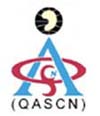
![]()

Home | About Us | Events | Facts & Figures | Resources | QAS Team | Contact Us | QAS Network
"Quality begins with Me"

Organized on the principle of "Assuring Quality, Ensuring Standards," Quality Assurance Consultants offers support through its diverse professionals in the vital fields of inspection, non-destructive evaluation, ISO, HACP, GMP consulting, program development and training. QASCN's expertise and perspective, acquired through the exacting standards demanded by our clients, can help your organization maximize productivity and provide you with a fresh look at your technical requirements. QASCN, starting in April 2000, has helped many major exporters and other corporates' of the southern India, attain Quality Certifications.
ISO
Does Your Organization Need ISO?
Do all companies need ISO-9000? The answer, of course, depends on the objective of each firm. Many of the small to medium-sized businesses that work with the 105 Export Assistance Centers throughout the country have found it useful and increasingly important in their efforts to win and retain clients overseas. Firms say it improves the sense of quality within the organization, builds confidence, provides for a means for continuous improvement and improves customer acceptance.
ISO 22000:2005 specifies requirements for a food safety management system where an organization in the food chain needs to demonstrate its ability to control food safety hazards in order to ensure that food is safe at the time of human consumption. It is applicable to all organizations, regardless of size, which are involved in any aspect of the food chain and want to implement systems that consistently provide safe products. The means of meeting any requirements of ISO 22000:2005 can be accomplished through the use of internal and/or external resources.
HACCP
Hazard Analysis and Critical Control Points (HACCP) is a systematic preventative approach to food safety that addresses physical, chemical and biological hazards as a means of prevention rather than finished product inspection. HACCP is used in the food industry to identify potential food safety hazards, so that key actions, known as Critical Control Points (CCP's) can be taken to reduce or eliminate the risk of the hazards being realized. The system is used at all stages of food production and preparation processes.
Today HACCP is being applied to industries other than food, such as cosmetics and pharmaceuticals.
This method, which in effect seeks to plan out unsafe practices, differs from traditional "produce and test" quality assurance methods which are less successful and inappropriate for highly perishable foods.
GMP
QASCN specializes in helping small, start up pharmaceutical and food processing firms establish efficient, cost effective quality systems that will pass inspection and produce high quality products. We also work with larger firms to review current systems to make them more efficient and robust enough to stand up to current regulatory challenges.
If your company wishes to have QASCN drive the implementation to comply with the GMP, we offer an implementation service that follows a 5-step methodology: Gap assessment, quality management system upgrade, training, internal audit, and certification audit. We will provide and generate all the required documentation to meet the requirements of the standard. The implementation usually involves streamlining and simplification of your operation to take full advantage of the benefits of the standard.
© Quality Assurance (QAS-INDIA) 2007 | Site developed by ICONS